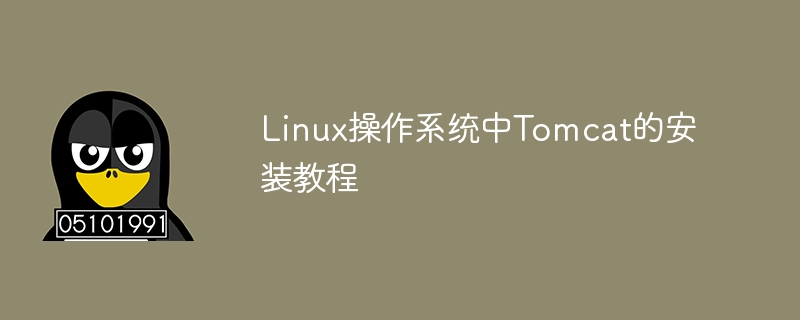

Tomcat installation tutorial in Linux operating system
Tomcat is an open source Java Web application server that is widely used in Internet development. In the Linux operating system, installing Tomcat can provide us with a powerful Web application platform. The following is a tutorial for installing Tomcat in a Linux system, including detailed code examples.
1. Download Tomcat
1.1 Open the browser and enter the official Apache Tomcat website (https://tomcat.apache.org).
1.2 Find the latest stable version of Tomcat on the homepage of the website, and click the download button to enter the download page.
1.3 According to the Linux operating system version, select the corresponding compressed package to download. It is generally recommended to download the compressed package in .tar.gz format.
2. Install Java JDK
2.1 Enter the following command in the Linux terminal to install Java JDK:
sudo apt-get install openjdk-8-jdk
2.2 Enter the password and confirm the installation.
2.3 After the installation is completed, enter the following command to verify whether the Java installation is successful:
java -version
If the Java version information is output, the installation is successful.
3. Decompress the Tomcat compressed package
3.1 In the command line terminal, switch to the directory where the Tomcat downloaded file is located.
3.2 Enter the following command to decompress the Tomcat compressed package:
tar xvfz apache-tomcat-9.0.45.tar.gz
Here takes Tomcat 9.0.45 version as an example , modify it according to the name of the actually downloaded compressed package.
4. Configure environment variables
4.1 Open the terminal and enter the following command to edit the environment variable file:
sudo vim /etc/profile
4.2 In Add the following configuration information at the end of the file:
export CATALINA_HOME=/path/to/tomcat
Replace "/path/to/tomcat" with the actual Tomcat installation path, such as "/usr /local/tomcat".
export PATH=$PATH:$CATALINA_HOME/bin
For Tomcat’s bin directory, make sure to add it to the system’s PATH variable.
4.3 Save the file and exit edit mode.
4.4 Enter the following command to make the environment variable take effect:
source /etc/profile
5. Start the Tomcat server
5.1 Enter the following in the terminal Command, switch to Tomcat's bin directory:
cd /path/to/tomcat/bin
Replace "/path/to/tomcat" with the actual Tomcat installation path.
5.2 Enter the following command to start the Tomcat server:
./startup.sh
If everything is normal, Tomcat startup log information will be output.
6. Verify Tomcat installation
6.1 Open the browser and enter the following address:
http://localhost:8080
If Tomcat can be displayed normally Welcome page, indicating successful installation.
7. Shut down the Tomcat server
7.1 Enter the following command in the terminal to switch to Tomcat’s bin directory:
cd /path/to/tomcat/bin
Replace "/path/to/tomcat" here with the actual Tomcat installation path.
7.2 Enter the following command to shut down the Tomcat server:
./shutdown.sh
If everything is normal, Tomcat shutdown log information will be output.
The above are the detailed steps for installing Tomcat in the Linux operating system. By following the above tutorial, you can successfully install and use Tomcat as a web application server. Please note that the specific installation steps may vary depending on the Tomcat version, but the basic principles are the same. I hope this article is helpful to you, and I wish you a happy use of Tomcat!
The above is the detailed content of Learn how to install Tomcat on Linux operating system. For more information, please follow other related articles on the PHP Chinese website!




